Along with the Lord’s Prayer, the Hail Mary is one of the most widely used prayers in the Catholic Church. The first half of the Hail Mary comes from Luke’s Gospel accounts of the Angel Gabriel’s annunciation to Mary that she was called to be the Mother of God’s Son (Lk 1:26-56).
St. John Paul II explains that although the Hail Mary is addressed to Our Lady, "it is to Jesus that the act of love is ultimately directed" (RVM, no. 26). Every time we recite the Hail Mary, we are repeating the words of Gabriel and Elizabeth. In doing so, we enter into the ecstatic joy of "heaven and earth" over the mystery of Christ: heaven, represented by Gabriel, and earth, represented by Elizabeth.
“Hail Mary, full of grace.”
This is the greeting the Angel Gabriel spoke to Mary of Nazareth. Gabriel proclaims that Mary is full of grace, meaning that she is a sinless woman, blessed with a deep union with God, who had come to dwell in her.
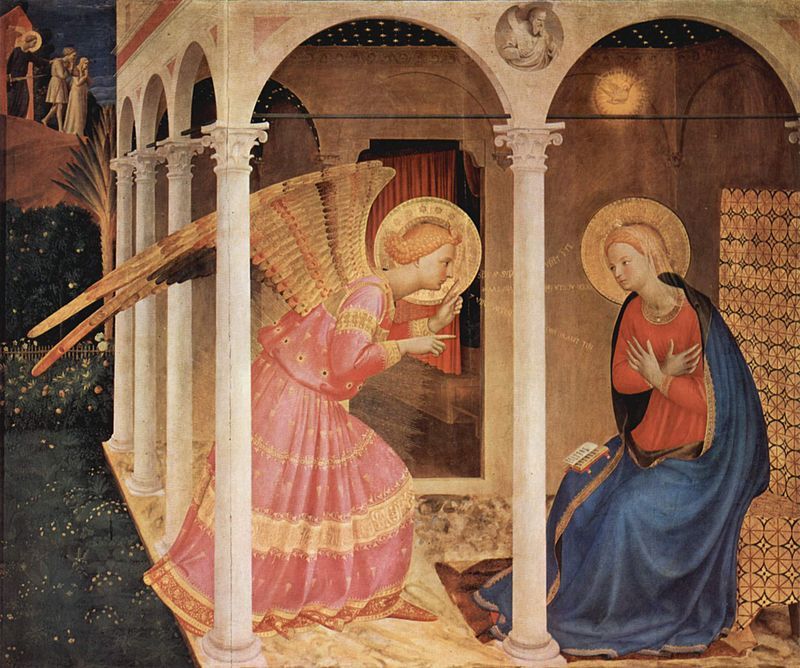 Annunciation- Fra AngelicoIn awe over that profound mystery of his eternal God becoming a little embryo in Mary's womb, Gabriel greets Mary. The grace with which Mary is filled is the very life of God who is the source of all grace.
Annunciation- Fra AngelicoIn awe over that profound mystery of his eternal God becoming a little embryo in Mary's womb, Gabriel greets Mary. The grace with which Mary is filled is the very life of God who is the source of all grace.
Reflect: Allow yourself to greet Mary in the same way and to exult in the same joy in Mary that God had for her. Imagine yourself bowing with the deepest respect before our Queen and Mother - imitating the reverence shown to her even by such a great being as an archangel.
“The Lord is with thee.”
Mary has been chosen by God for this great privilege. He is with her, having already preserved her from sin and filled her with grace. This does not mean that Mary is deprived of her freedom. She lives in graced friendship with God and freely offers him her undivided heart.
 Annunciation - Henry Tanner (1898)Mary was constantly listening to God and his voice in her heart. He was with her as an active presence, an constant relationship in which she was in continual peace and companionship with God. Even when distracted by worldly chores and business, God’s presence was the backdrop of her life.
Annunciation - Henry Tanner (1898)Mary was constantly listening to God and his voice in her heart. He was with her as an active presence, an constant relationship in which she was in continual peace and companionship with God. Even when distracted by worldly chores and business, God’s presence was the backdrop of her life.
Relfect: The Lord wishes also to be with you, not only at your fixed times of prayer or while you are at Church, but at all times. He is always present whatever we do, wherever we are. How can you be more aware of His constant presence today?
“Blessed art thou among women.”
This was the greeting given Mary by her cousin Elizabeth when Mary came to visit and help Elizabeth with the birth of her forthcoming child (Lk 1:42). As Scripture points out, Mary holds a singular place among all God’s chosen ones in the history of salvation. Mary is the world’s most honored woman.
![]() Icon of the Visitation - Christine UvegesThe biblical account of the Visitation tells us that Elizabeth was "filled with the Holy Spirit" (Lk. 1:41), which indicates that she was given prophetic insight. Before Mary has a chance to say anything about her own pregnancy, Elizabeth already knows. And she knows Mary is pregnant not with any ordinary child, but with the Lord Himself. Elizabeth's exclamation in wonder over this mystery of God becoming man in Mary gives praise to God for the gift of His Son.
Icon of the Visitation - Christine UvegesThe biblical account of the Visitation tells us that Elizabeth was "filled with the Holy Spirit" (Lk. 1:41), which indicates that she was given prophetic insight. Before Mary has a chance to say anything about her own pregnancy, Elizabeth already knows. And she knows Mary is pregnant not with any ordinary child, but with the Lord Himself. Elizabeth's exclamation in wonder over this mystery of God becoming man in Mary gives praise to God for the gift of His Son.
Reflect: Join Elizabeth in greeting Mary this way. Elizabeth is the first of countless numbers of people from every generation who have called Mary "blessed." Mary is blessed because she believed and accepted for herself God's words to her.
“Blessed is the fruit of thy womb, Jesus.”
This is another beatitude or blessing uttered by Elizabeth, who spoke these words after her child, John the Baptist, leaped in her womb at the moment she hears the greeting of Mary. Elizabeth is inspired by the Holy Spirit to bless Mary for believing the message of Gabriel. Elizabeth acknowledges the presence of God in Mary’s womb: “How does this happen to me, that the mother of my Lord should come to me?” (Lk 1:43). This is the first time in Scripture that Mary’s faith is praised.
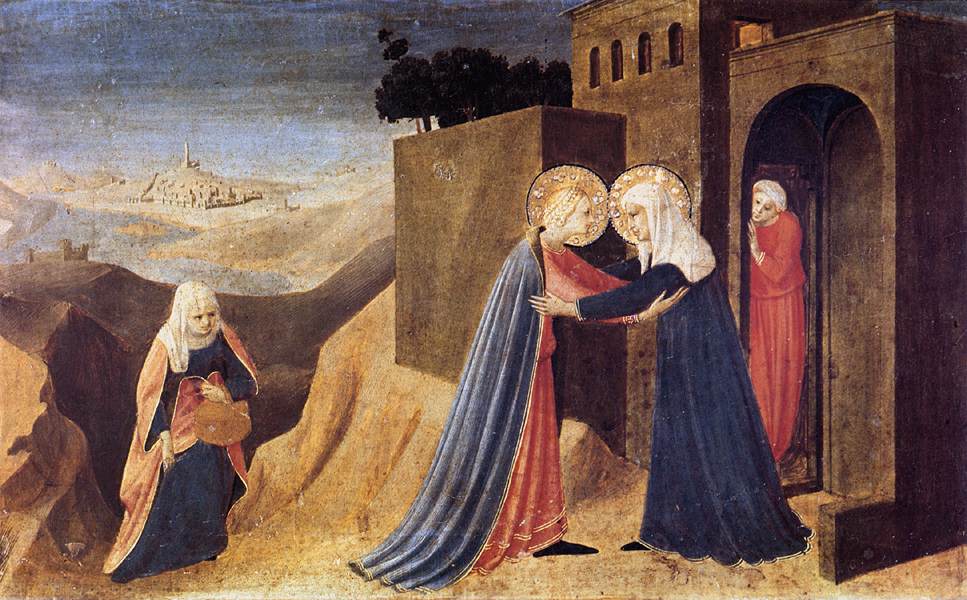 Visitation - Fra Angelico St. John Paul II calls the holy name of Jesus "the hinge" of this prayer. Not only is the name of Jesus the hinge that binds the two halves together, but it is truly meant to be the "center of gravity" of the entire Hail Mary. This should encourage us to examine how we pray the Hail Mary:
Visitation - Fra Angelico St. John Paul II calls the holy name of Jesus "the hinge" of this prayer. Not only is the name of Jesus the hinge that binds the two halves together, but it is truly meant to be the "center of gravity" of the entire Hail Mary. This should encourage us to examine how we pray the Hail Mary:
Reflect: Is Jesus' name truly "the center of gravity" of my prayer? Do I treat the name of Jesus with extra care and speak His name with love?
“Holy Mary, Mother of God.”
Sometime in the Middle Ages, the second half of the Hail Mary, which begins by invoking her title of Mother of God, was composed. This title comes from the earliest days of Christian faith. Mary is the Mother of God, because she is the mother of Jesus who is true God and true man, as defined by the Council of Ephesus in AD 431. The Eastern Churches call Mary Theotokos, or “Birth-giver of God” (sometimes translated as “God-bearer”). Mary’s response to God engages her in the plan of human salvation through motherhood of Jesus.
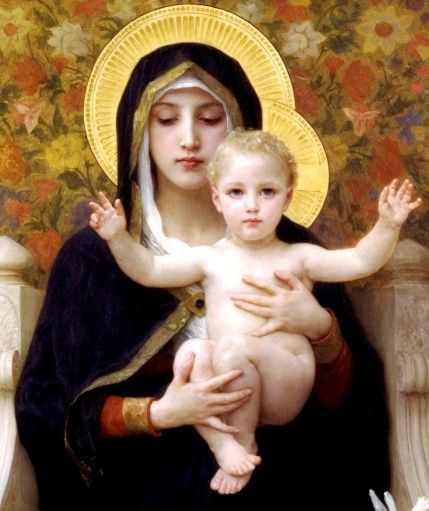 Madonna of the Lilies - William-Adolphe Bouguereau The second half of the Hail Mary is an intercessory prayer developed in the Church’s tradition - a prayer where we ask Mary to pray for us and our needs.
Madonna of the Lilies - William-Adolphe Bouguereau The second half of the Hail Mary is an intercessory prayer developed in the Church’s tradition - a prayer where we ask Mary to pray for us and our needs.
Because she has given the world Jesus, Mary is the Mother of God. She is also our Mother as Jesus spoke from the cross to his beloved disciple John: " Behold your mother," Jesus said. We are deeply indebted to God for having given us Mary as our Mother.
Reflect: On the feast of Mary, Mother of God (Jan 1) in 2014, Pope Francis said that Mary communicates “her maternal affection to each and every person… a source of hope and true joy.” He encourages us to entrust to her “the journey of faith, the desires of our heart, our needs and the needs of the whole world, especially of those who hunger and thirst for justice and peace."
“Pray for us sinners.”
Intercessory prayer concerns the needs and hopes of others. Jesus Christ, our High Priest, always intercedes for us before the Father, and he calls us to intercede for others as well. The saints and the Blessed Virgin Mary continue this prayer of intercession in heaven. As Mother of the Church, Mary continues to pray with a mother’s care for the Body of her Son on earth. At Cana, Mary interceded with Jesus on behalf of the couple who had run out of wine. Jesus heard her prayer and turned water into wine. Mary’s last words in Scripture are spoken to us: “Do whatever he [Jesus] tells you” (Jn 2:5). Our holy Mother always brings us to Jesus.
 Our Lady of the Miraculous MedalWe acknowledge ourselves as poor sinners as we reach out to our Mother of Mercy. As a model disciple of Christ, who said "yes" to God's will all throughout her life -- from the time when Gabriel first appeared to her all the way to the Cross -- Mary is the ideal person to be interceding for us through the many trials and struggles we face in our lives.
Our Lady of the Miraculous MedalWe acknowledge ourselves as poor sinners as we reach out to our Mother of Mercy. As a model disciple of Christ, who said "yes" to God's will all throughout her life -- from the time when Gabriel first appeared to her all the way to the Cross -- Mary is the ideal person to be interceding for us through the many trials and struggles we face in our lives.
Reflection: "The mother of God becomes the refuge of sinners, the servant of all. What heart is not overpowered with joy." - Father Isaac T. Hecker, founder of the Paulist Fathers.
“Now and at the hour of our death. Amen.”
In her life, Mary walked a pilgrimage of faith. Even with all the grace she received from God, she encountered the mysterious ways of God and profound suffering, especially at the death of her Son. She knows what a journey of faith entails, and she accompanies us with prayer as we make our journey to God throughout our lives and at death.
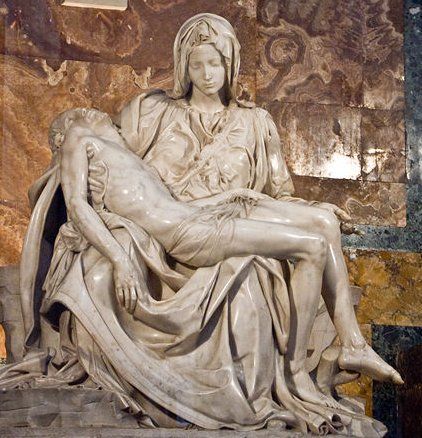 Michelangelo's Pieta - St. Peter's BasilicaWe ask Jesus, Mary and Joseph to help us to prepare for our death by a good life. We also pray for a happy death, which means dying in a state of grace, fortified by the sacraments of the Church. We pray in the confidence that Mary will lead us to her Son, Jesus, in paradise.
Michelangelo's Pieta - St. Peter's BasilicaWe ask Jesus, Mary and Joseph to help us to prepare for our death by a good life. We also pray for a happy death, which means dying in a state of grace, fortified by the sacraments of the Church. We pray in the confidence that Mary will lead us to her Son, Jesus, in paradise.
Reflection: "If we are to have the protection of the Blessed Virgin Mary, we must become like her Son, for to gain the affection of a person, we must become like the object of their love." (Father Isaac T. Hecker, founder of the Paulist Fathers.)
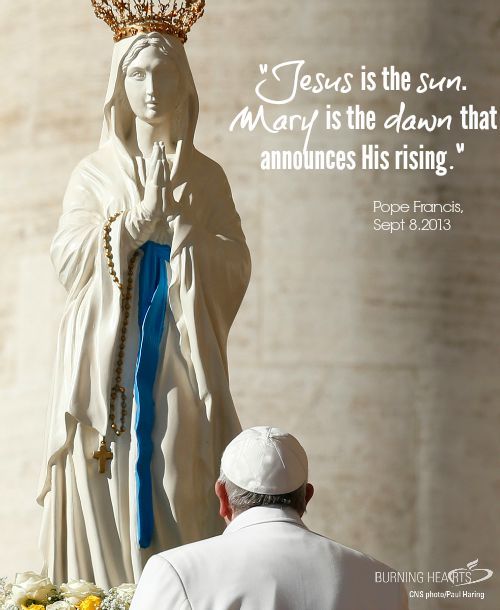
Quotations from the United States Catholic Catechism for Adults, copyright © 2006, United States Conference of Catholic Bishops, Washington DC. All rights reserved. Used with permission.

